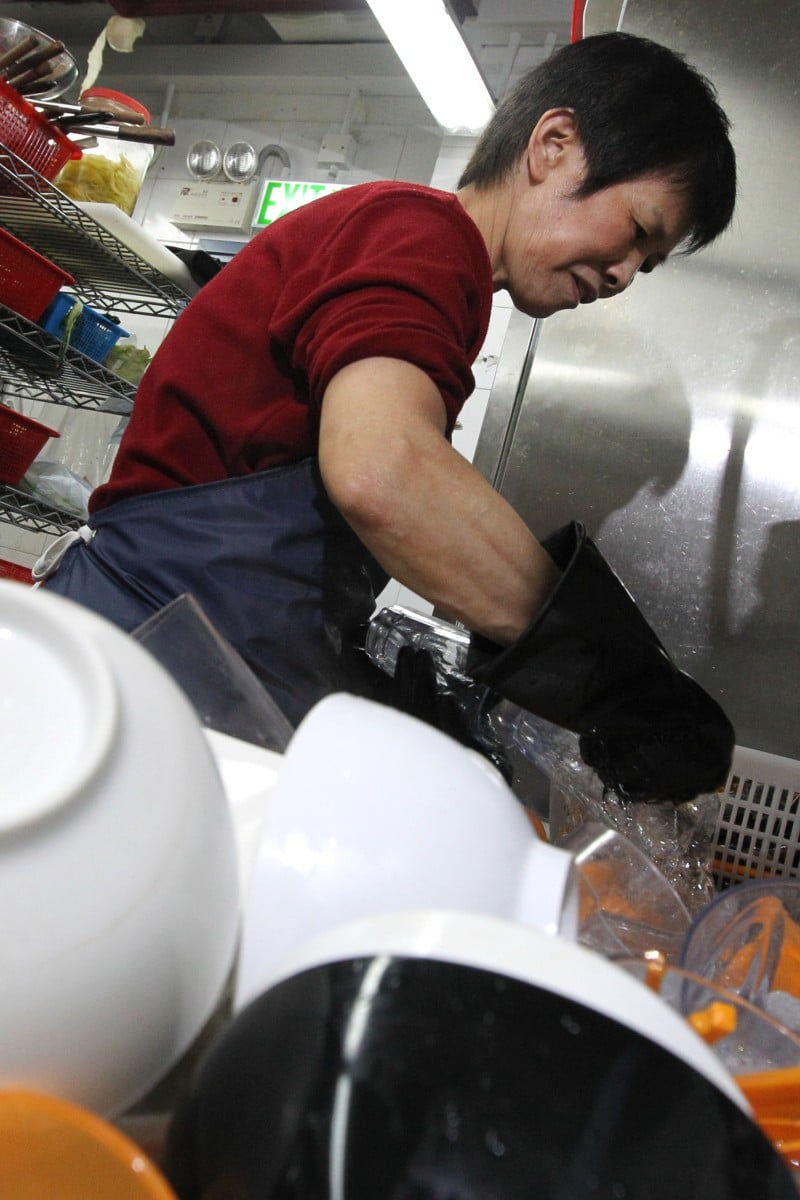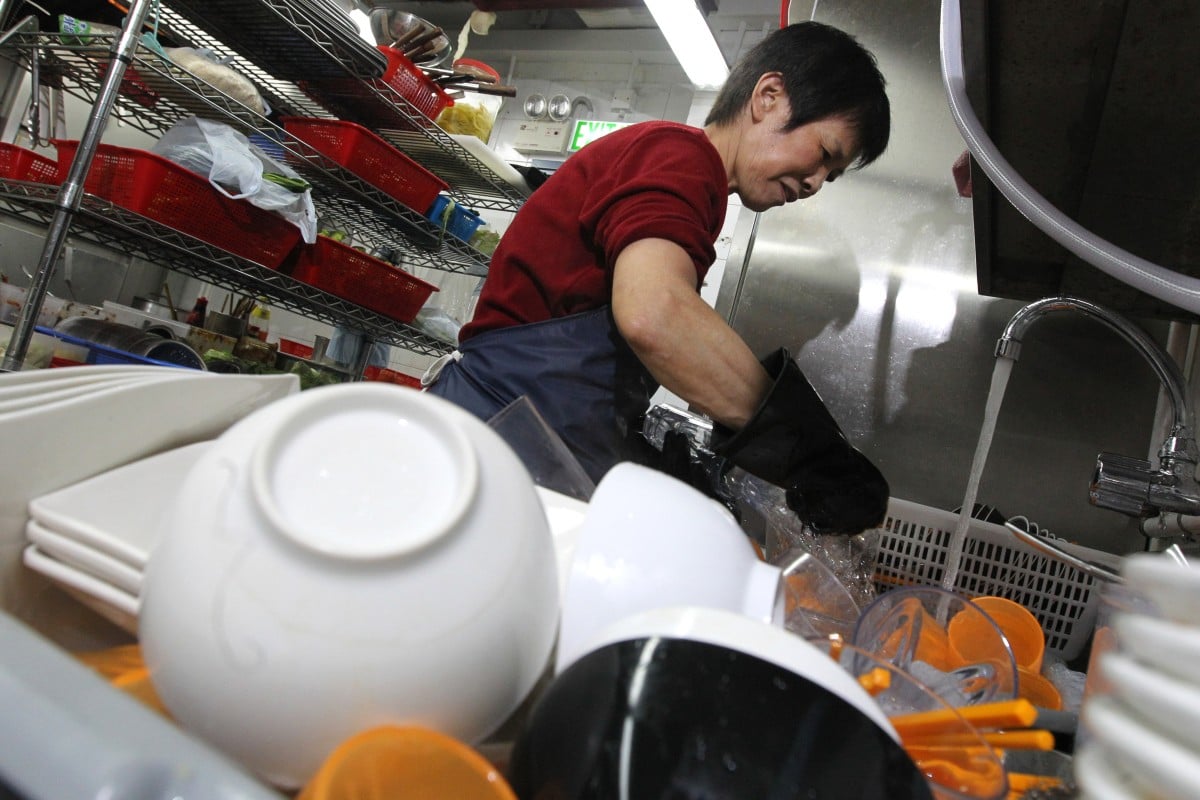
Spark Deep Dive: Hong Kong workers complain of losing jobs to imported labour
Government scheme to bring in low-skilled workers was meant to address the city’s manpower issues, but some say local employees are being replaced
 Many Hong Kong restaurant workers, especially older employees, say they worry about the influx of imported labourers from mainland China. Photo: May Tse
Many Hong Kong restaurant workers, especially older employees, say they worry about the influx of imported labourers from mainland China. Photo: May TseDeep Dive delves into hot issues in Hong Kong and mainland China. Our easy-to-read articles provide context to grasp what’s happening, while our questions help you craft informed responses. Check sample answers at the end of the page.
News: Hong Kong workers complain of losing jobs to imported labour
-
More than 200 restaurant employees say they have been replaced by workers who came to the city via an import scheme
-
Local employees are often forced to take hourly or daily wages, while imported workers receive salaries and contracts
Hongkonger Har Cheng* was forced to quit the food stall she had worked at for almost two decades. She later found out she had been replaced by imported labourers from mainland China.
Cheng, 67, felt angry and mistreated. She spent years helping to wash dishes, clean tables, and sell beers at the traditional dai pai dong. She said her loyalty over the years had all been “for nothing”.
“I thought I had a few more years to work before retirement, and the stall had at least 28 workers,” she said. How could I expect I would be the first to be targeted?”
Over the past six months, Cheng and 200 other restaurant workers have reported being sacked and replaced by labourers who came to the city via an import scheme, according to the Eating Establishment Employees General Union.
Unionists and human rights advocacy group the Society for Community Organisation raised concerns about the impact of the scheme ahead of Labour Day on May 1. They said they had received reports from local workers who were replaced by imported labourers.
The scheme was introduced in 2023 to combat the city’s manpower shortage. The government began allowing employers to bring in unskilled or low-skilled workers from the mainland for 26 new job types, including waiters and hospitality staff in catering.
So far, 54,278 workers have been allowed to come to the city. The catering sector accounted for most of these jobs, with around 8,900 waiters, 11,400 chefs and 2,700 dishwashers working in restaurant chains, street food stalls and other diners.
Cheng said the employer had cut her working hours from eight to four hours a day after a few imported labourers arrived in February. Normally, she would earn up to HK$16,000 (US$2,062) a month. She could barely afford her rent with the reduced working hours.
She spoke to her employer and was told to resign if she did not accept the new arrangement. Cheng said she was forced to quit in March.
According to the union’s labour rights committee, the fired workers were mostly older and had flexible contracts.
Imported labourers were required to sign contracts and received monthly salaries. However, local workers were forced to take hourly or daily wages to cater to the restaurant’s operational needs.
*Name changed at interviewee’s request.
Staff writers
Question prompts
1. Which of the following is true, according to the news?
(1) Har Cheng quit her job when she was denied retirement benefits.
(2) More than 200 restaurant workers have reported being sacked because of the import scheme.
(3) Imported workers don’t require contracts.
(4) Around 54,000 mainland workers have come to the city since 2023.
A. (1), (2) only
B. (2), (3) only
C. (2), (4) only
D. (3), (4) only
2. According to the news, which groups are particularly vulnerable to the city’s import scheme?
3. How does the labour import scheme affect the working conditions and job security of local restaurant workers like Cheng? Explain using the news and glossary.
Question prompts
1. What is being shown in the photo? How does it relate to the information in the news?
2. Using the news and glossary, explain why Hong Kong introduced imported labourers.
Glossary
import scheme: refers to the Enhanced Supplementary Labour Scheme launched in September 2023. It was designed to address the manpower shortage across different sectors, including ones considered unskilled or low-skilled, and allows businesses to recruit workers from outside Hong Kong, mainly mainland China.
Society for Community Organisation: a non-governmental human rights advocacy group founded in Hong Kong in 1971
operational needs: the necessary resources and services a business needs to run. These include employees, equipment, materials, and other supplies.
Sample answers
News
1. C
2. Local workers who are older and have flexible contracts.
3. The scheme has reportedly led to local workers like Cheng being replaced or having their hours cut significantly. Despite years of loyalty, Cheng’s working hours were halved, drastically reducing her income and forcing her to quit when she objected. Many affected workers were older and on flexible contracts, making them more vulnerable to being replaced. In contrast, imported labourers are given more stable monthly salaries and written contracts, highlighting an imbalance in job security and treatment between local and imported workers.
Photo
1. The photo shows a restaurant employee who could be susceptible to the city’s labour import scheme discussed in the news.
2. Hong Kong was facing a shortage of workers, especially in low-skilled jobs like catering and hospitality. The import scheme was launched to bring in workers from mainland China to supplement existing local workers and help businesses continue to operate.
